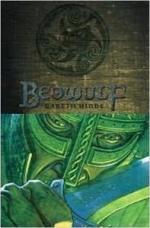|
|
Beowulf Topic Tracking: Christian/Pagan Ritual
Christian/Pagan Ritual 1: Beowulf is an essentially pagan poem. Its composition occurred at the same time as England's conversion to Christianity. When Prince Beo is born, it is "allowed by the grace of god/...Lord of all life, Ruler/ Of glory". The poem combines direct references to the Old Testament with pagan references, quite often:
"[R]ecalling/ The Almighty making of the earth, shaping/ These beautiful plains marked off by oceans,/ Then proudly setting the sun and moon/ To glow across the land and light it;/...made quick with life, with each/ Of the nations who now move on its face." pg. 26, lines 91-98
Christian/Pagan Ritual 2: Beowulf's words in this final address reference fate,-that things will turn out as they will. The pagan concept of fate was called wyrd, and was a persistent part of later Anglo-Saxon Christian poetry, which much like Beowulf, combined the two opposing ideas.
Christian/Pagan Ritual 3: Beowulf's battle with nine sea-monsters in his youth, reference both fate, or wyrd, and the Christian name of God, as being responsible for assisting him. When he is fighting with the first sea-monster, "fate let me/ Find its heart [monster's] with my sword". Later, upon his arrival on the Finnish coast:
"God's bright beacon/ Appeared in the east, the water lay still,/ And at last I could see the land, wind-swept/ Cliff-walls to the coast. Fate saves/ The living when they drive away death by themselves!" pg. 41, lines 569-574
Christian/Pagan Ritual 4: Hrothgar attributes Beowulf's success directly to Christ, and more so, to an end of a war between "men and devils, warriors and monstrous fiends".
"Let God be thanked! Grendel's terrible/ Anger hung over our heads too long,/ Dropping down misery; but the Almighty makes miracles/ When he pleases, wonder after wonder, and this world/ Rests in his hands. I had given up hope,/ Exhausted prayer, expected nothing/ But misfortune forever." pg. 52, lines 928-934
Christian/Pagan Ritual 5: Homer combines interesting references to the Old Testament and Christian dogma. The emphasis on revenge refers to "An eye for an eye", from the Old Testament, while Beowulf also speaks of the finiteness of life and importance of the soul after death.
Christian/Pagan Ritual 6: Hrothgar gives a warning to Beowulf not to become too content in peace or prosperity; not to take any of his power for granted. He suggests that Beowulf remember that all things on earth are ruled by God, that sin is possible and always present, that humans can never think themselves too proud, because plagues like Grendel, brought on by humankind's own sin, will always return to challenge the controlled order of existence.
Christian/Pagan Ritual 7: Hrothgar's warning and advice to Beowulf combine clear Christian morality of generosity, giving, lack of pride and greed, with the rituals of gold-giving practiced in kingdoms at this time.
Christian/Pagan Ritual 8: "So Edgetho's son proved himself,/ Did as a famous soldier must do/ If glory is what he seeks: not killing his comrades/ In drunken rages, his heart not savage,/ But guarding God's gracious gift, his strength,/ Using it only in war, and then using it/ Bravely." pg. 91, lines 2177-2183
Christian/Pagan Ritual 9: Beowulf says that fate will decide who shall win the battle. Fate is also referenced by Beowulf earlier in relation to his doings with the dragon.
"[W]hen he comes to me/ I mean to stand, not run from his shooting/ Flames, stand till fate decides/ Which of us wins. My heart is firm,/ My hands calm: I need no hot/ Words." pg. 101, lines 2524-2529
Christian/Pagan Ritual 10: The ritual that Wiglaf performs over the dying Beowulf, to revive him with water, is akin to Baptism.




